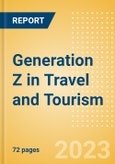This thematic research report takes an in-depth look at the theme of Generation Z and the impact it has on the travel and tourism industry. This report analyzes the players impacted by this theme alongside the contributing trends, negative destination trends, unintended opportunities, and trends that have emerged as a result of Gen Z. It then dives deep into an industry analysis, presenting several real-life case studies looking at how destinations and companies have responded to the impact of this theme on their operations. Recommendations are then offered for the travel sector, alongside a description of companies mentioned throughout.
Key Highlights
Gen Z has been called the most disruptive generation ever by Bank of America, and its influence is on the rise at a time of great uncertainty. Today's world faces simultaneous and severe geopolitical, economic, social, environmental, and demographic stresses and strains, and Gen Z will shape and disrupt every sector in this changing global economy, with the travel & tourism sector being no different.Gen Z uses social media before, during, and after a trip, making it a key component throughout the travel journey. It is increasingly important that destination marketing organizations (DMOs) and travel companies harness this tool as a result. ‘Instagrammable’ travel trends now largely influence the perception of a destination and the inspiration of a tourist pre-trip. The photo-sharing-based app has rapidly developed from being simply a platform to share photos of a vacation to peers; now DMOs, tour operators, airlines, travel agents, and companies have embraced Instagram, acknowledging that it is a key factor within the booking process among Generation Z.
Gen Z is already characterized by having particular expectations and needs from the businesses they engage with. For example, the increased need for sustainability from Gen Z has forced companies to face up to their environmental impact, which many avoided doing before the buying power of this market segment became too big to ignore. Tourism is well-placed to capitalize on a new wave of demands from Gen Z, given its experiential and personable nature. That being said, sustained effort is still needed to fully engage with this highly nuanced cohort. A key underlying theme in the graphic below is that most of the leading players have incorporated online platforms. From ‘communicating’ to ‘social media’ to the more travel-specific shift of ‘experiences’ to ‘personalization’, the shift in these consumer preferences is driven by internet usage.
Who should buy?
CEOs, Senior Executives, and Marketing Executives within travel and tourism should use this report to understand the highly important theme of Generation Z.Scope
- This thematic report provides an overview of the impact Generation Z has on the travel sector and seeks to understand some of the contributory factors.
- Several case studies are included to analyze the multiple ways countries and companies have responded to this generation’s growth and what they are doing to grow with this theme.
Reasons to Buy
- Understand the current trends surrounding Generation Z within the travel landscape today and how these will escalate in the near future.
- Assess how travel and tourism companies such as tour operators, OTAs and DMOs are connecting with Generation Z to drive revenues.
- Acknowledge the necessity of appealing to Generation Z by understanding the social, cultural, and environmental effects on the destination.
- The analyst's thematic research ecosystem is a single, integrated global research platform that provides an easy-to-use framework for tracking all themes across all companies in all sectors. It has a proven track record of identifying the important themes early, enabling companies to make the right investments ahead of the competition, and secure that all-important competitive advantage.
- All across the travel and tourism supply chain, now have an opportunity to capitalize on Generation Z, and there are notable examples of this. Therefore, all should buy this report to fully understand how this theme will continue to be a key theme in the future travel landscape.
Table of Contents
- Executive Summary
- Players
- Demographic Briefing
- Generational profiles - what is Gen Z?
- The current state of the world’s population
- The current state of Gen Z
- Geographical Analysis
- Case studies
- Trends
- Business Impact
- Gen Z’s impact on the travel & tourism sector
- Travel & tourism challenges being faced as a result of Gen Z
- Companies
- Public companies
- Private companies
- Sector Scorecards
- Glossary
- Further Reading
- Thematic Research Methodology
- About the Publisher
- Contact the Publisher
Companies Mentioned (Partial List)
A selection of companies mentioned in this report includes, but is not limited to:
- Air France
- Airbnb
- Bidroom
- Booking Holdings
- Contiki
- Despegar
- EasyJet
- eDreams ODIGEO
- Etihad
- Expedia Group
- Flight Centre Travel Group
- G Adventures
- GetYourGuide
- Hays Travel
- Hilton
- Hostelworld
- IndiGo
- Intrepid Travel
- Jet2
- MakeMyTrip
- Marriott
- Norse Atlantic Airways
- Norwegian Cruise Line
- On The Beach Group
- OYO Rooms
- Qantas
- REI Adventures
- Ryanair
- Sawday's Canopy & Stars
- Secret Escapes
- Seera
- TikTok
- Treebo
- Trip.com Group
- TripAdvisor
- TUI
- Tuniu
- W Hotels
- Wego
- YouTube








